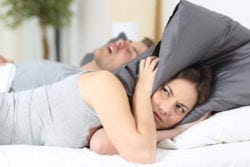Do you snore during sleep? Is trouble breathing keeping you up at night?
Although snoring alone is not a cause for alarm, snoring in conjunction with other symptoms may be a sign of an undiagnosed sleep disorder. If you or someone you love experiences loud snoring during sleep, you may want to get screened for sleep apnea. Sleep apnea is a life-threatening sleep condition that should be addressed by a specialist as soon as possible.
Sleep apnea can have detrimental effects on your overall health if left untreated. The most common type of sleep apnea called Obstructive Sleep Apnea (OSA) can increase your risk of stroke, heart attack, and other systemic diseases. Finding the right solution to alleviate your symptoms and restore your quality of sleep can improve your overall health. Dr. Joyce Kim can treat your sleep apnea symptoms and provide affordable sleep apnea treatments for all ages.
What Is Sleep Apnea?
Obstructive sleep apnea is a sleep disorder that occurs when the soft tissue in the back of the throat collapses, causing a restriction in airflow through the nose and mouth. The lack of oxygen can affect vital organs in your body and may cause a wide range of health concerns.

Common Signs & Symptoms of Sleep Apnea
Patients with sleep apnea may experience restlessness, difficulty concentrating, and sleepiness throughout the day.
Patients with sleep apnea may also experience:
- Loud snoring
- Gasping for air during sleep
- Irritability
- High blood pressure
- Headaches or migraines (especially in the morning)
- Depression
- Dry mouth or a sore throat
- Chronic fatigue
If you are experiencing any of these signs or you have a formal diagnosis for sleep apnea, please disclose this information during your visit. If you notice you or a loved one is experiencing any of these signs, a proper diagnosis and treatment plan is a necessary part of restoring your health and quality of sleep.
Sleep Apnea FAQs
How can sleep apnea impact my life?
Untreated sleep apnea can heavily impact your quality of life. Your mental ability will begin to slow because of the apnea episodes. You’re tired throughout the day and may find it hard to function normally. These issues can impact your mental health negatively as well. Sleep apnea can even shorten your life expectancy by 12-15 years if it isn’t taken care of.
Does sleep apnea get worse with age?
Sleep apnea can either develop or get worse with age. As we get older, we lose muscle tone all over our bodies. This includes your airway and muscles around your throat and mouth. This makes it more likely for the soft tissue to collapse into the back of your throat.
Is sleep apnea considered a disability?
Sleep apnea on its own isn’t considered a disability by the Social Security Administration. However, there are conditions that can occur in tandem with sleep apnea that may qualify. Heart problems, mental issues, and more may qualify as disabilities.
Treating Sleep Apnea in Williamsport, PA
Most patients do not realize they have sleep apnea until they visit a specialist. Many signs of sleep apnea may mimic other health concerns, so patients don’t realize they may need to visit a sleep specialist. Receiving treatment for sleep apnea is vital to maintaining optimal overall health. In severe cases of sleep apnea, patients may take pauses in breathing during their sleep, which can restrict oxygen flow to the vital organs in the body.
Our team at Loyalsock Dental in Williamsport, PA offers oral appliance therapy for patients with sleep apnea. Our goal is to alleviate the symptoms of sleep apnea and allow patients to get the rest they need.
The most traditional treatment option for sleep apnea is the CPAP machine. However, oral appliance therapy has been proven to be an effective, comfortable solution for treating sleep apnea. The oral appliance is similar to a mouthguard and is designed to realign the jaw to allow a healthy, adequate amount of oxygen flow. Dr. Kim will take impressions of your teeth, gums, and mouth to create a custom-designed sleep appliance. Patients should wear their oral sleep applicate to promote healthy breathing and reduce symptoms of sleep apnea.
